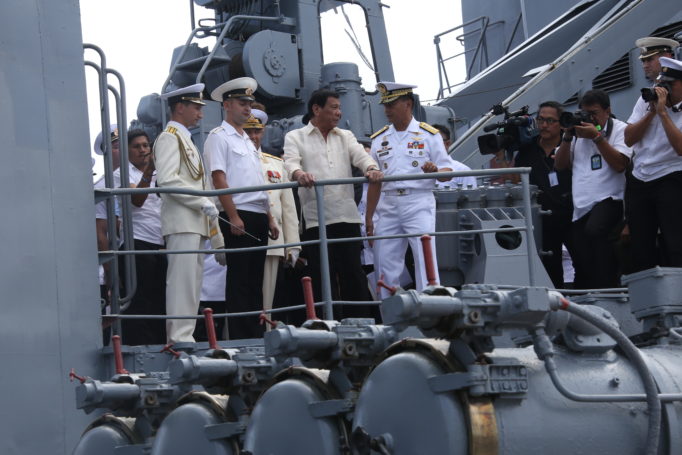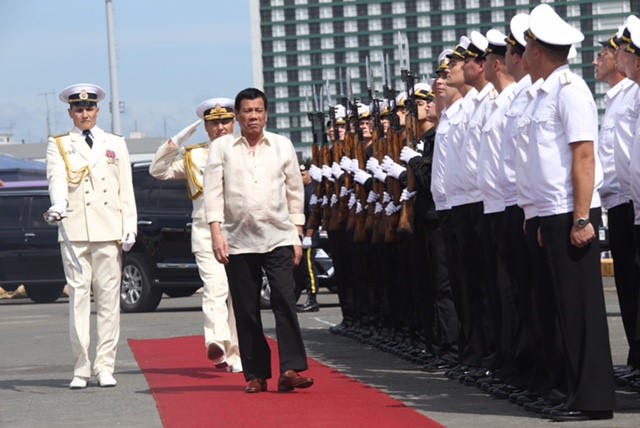In October 2016, President Rodrigo Duterte announced his plans to establish closer ties with Russia and China. Weeks later, he sent Defense Secretary Delfin Lorenzana to Moscow for exploratory talks on defense matters. Accordingly, the Russians offered defense equipment including a submarine and drones. In early January 2017, two Russian Federation Navy (RFN) ships of Russia Federation’s Pacific Fleet made a goodwill tour in Manila’s South Harbor. As a result, the Russian ambassador to the Philippines and the naval leaders who came for the goodwill visit are looking forward to a drafting of an Agreement on Defense Cooperation that would pave the way for defense equipment acquisition, and military training opportunities including anti-piracy and anti-terrorism.
In an unprecedented move, President Duterte became the first Philippine Armed Forces’ Commander-In-Chief to visit a Russian ship, the RFNS Admiral Tributs, an anti-submarine destroyer, tagging along with top defense and military officials. The Russians accorded the president full military honors and later opened doors to the public to view the warship.
Is this recent presidential foreign combatant ship visit an indication that the Philippines will eventually pursue an independent foreign policy with no strings attached?
Like other strong navies, the Russian Federation Navy assumes several roles apart from naval defense: reassure friends of support, help gain friends and discourage states without navies to develop them. The Russian Navy likewise undertakes a variety of missions: strategic deterrence, status projection, sea denial, sea control and coastal defense. Those roles and missions emerge from Russia’s national security strategy, which calls for strengthening national security, ensuring sustainable development, and committing to its Maritime Doctrine, that boosts Russia’s position as a sea power and lends hope to counter NATO’s expansion. The RFN’s structure consists of surface, air, sub-surface and naval infantry units distributed to the Northern Fleet, Pacific Fleet, Baltic Sea Fleet, Black Sea Fleet, and the Caspian Flotilla. Its latest deployments include the Mediterranean naval task force to support the Syrian government versus the latter’s fight against ISIS and the naval patrols in the Arctic Ocean, an area which Russia considers its main resource area for the 21st century. The RFN’s Pacific Fleet in Asia-Pacific focuses on safety of navigation, anti-piracy, anti-drug trafficking, anti-smuggling, assistance to vessels in distress, and “status projection.”
The Philippines, unlike Russia, has not fully developed its navy. The Philippine Navy (PN) operates assets handed down by the most powerful navy in the world. But it possesses limited surface and air capability. Aware of naval defense shortfalls, the PN would regularly craft capability development plans, in line with the Armed Forces’ modernization and self-reliant defense posture, but despite all well-laid plans, fails to convince the higher authorities to concretize the plans. Some planners attribute unsuccessful planning proposals to weak political will and blind adherence to continental strategy as opposed to maritime strategy. But perhaps, in the near future, the conflicting claims in South China Sea and the promise of the Benham Rise plateau exploration in the northeast Philippine Sea may finally ignite a patriotic spirit to fight for a strong sea-going force.
The maritime environment consisting of trade routes or sea lines of communications, chokepoints, ports, offshore energy-generating platforms, fishing areas and other infrastructures must be protected and conserved by a lean but credible navy. Indeed with its vast maritime territory, the Philippines needs a changed “mind-set” of its political and military leaders. President Duterte’s view to gain other affiliations may just be the way to lead our country into becoming a maritime power in the future.

